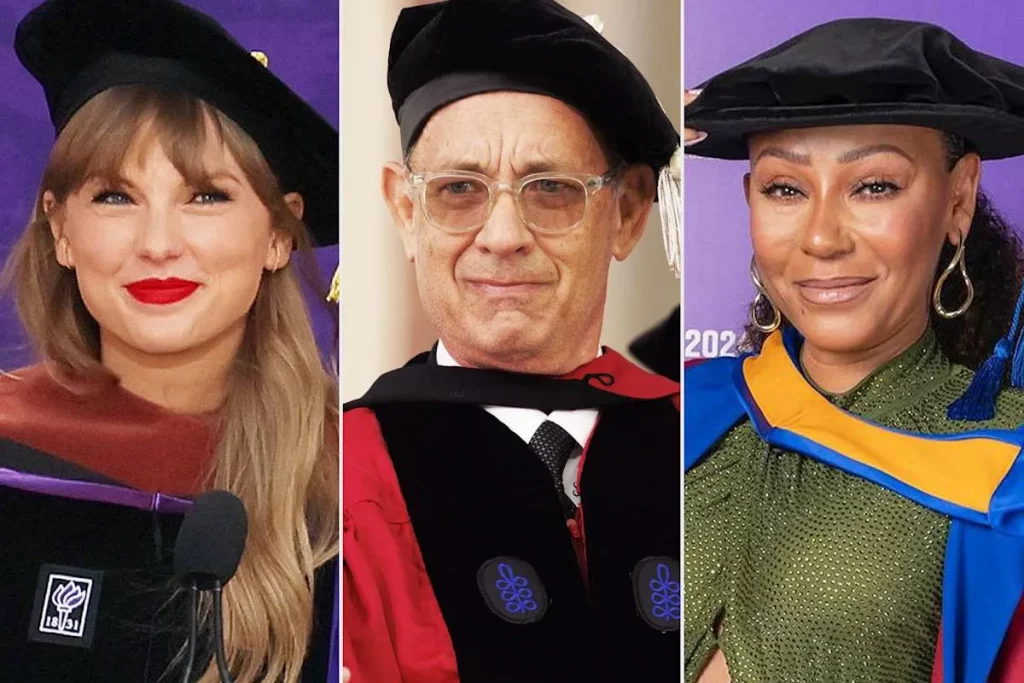I remember watching Taylor Swift’s NYU commencement speech in 2022, where she playfully thanked NYU for making her a doctor. “At least on paper”, she said. We all have come across people with ‘Dr.’ titles and sometimes might have wondered about their profession, right? It’s interesting how context can shape our understanding of achievements and expertise.

Read on to find out whether ‘Dr.’ is a fitting title for someone with an honorary doctorate, how an honorary Dr degree is earned, how it differs from a research doctorate, how its use changes from place to place, while also familiarizing yourself with Honorary Doctorate programs. Yes, not everyone has to be Barack Obama, Oprah Winfrey, Lata Mangeshkar, Amitabh Bachan, or Muhammad Ali to be awarded an honorary PhD; you can be a local hero too. An influential work that anyone has done and continues to do at any scale towards uplifting our societies should also be recognized.
What is an Honorary PhD?
An Honorary PhD, also known as an honorary doctorate, or Doctor Honoris Causa (“Doctor for the sake of honor”), is a doctoral degree awarded by a university or other academic institution. It is to honour the contributions of a particular person in a certain field, to society, or to the institution itself, based on a lifetime of whole lifetime, but without having to complete the standard course requirements (coursework, dissertation, or examinations) for the degree. An honorary PhD is, unlike a PhD earned, an academic award, a mark of distinction awarded in recognition of a career in academia, the arts, letters, the sciences, public service, or philanthropy.
Common Honorary Doctorate Titles:
- Doctor of Humane Letters( D.H.L/L.H.D)
- Doctor of Laws(LL.D)
- Doctor of Fine Arts(DFA)
- Doctor of Science(Sc.D)
Honorary PhD vs. PhD by Research
The paths to earning doctorates differ, reflecting distinct achievements.
Honorary PhD
- An Honorary Award in recognition of contributions
- No need for academic requirements
- Dr. title as a ceremonial and honorary distinction
- Chosen and presented by the university honorary committee
- Mostly awarded later in life, since a high-level impact in their field takes years to achieve
PhD by Research
- A terminal degree recognizing academic excellence and research contributions
- Require coursework, exams, original research, and a dissertation defense
- Dr. title in academic and professional settings, indicating a high level of expertise and qualification
- Post-Master’s Degree, evaluated by an academic panel
- Typically takes around 3 to 7 years to complete
Etiquette of Adopting the ‘Dr.’ Title
Even though a recipient of an honorary PhD is referred to as ‘Dr.’, it is important to make clear that their degree is of an honorary nature. The achievement behind it is very real, and it should be acknowledged as well.
- In public events or ceremonies, people often address honorary PhD recipients as ‘Dr.’
- When referencing their titles in bios, include ‘Honorary Doctorate’ for clarity.
- For personal branding and promotions, use ‘Dr.’ with ‘honorary doctorate’ notation.
- Most institutions recommend not using the ‘Dr.’ title for honorary PhDs unless you clarify it’s an honorary degree
- In the medical context, completely avoid the prefix ‘Dr.’
Using post-nominal letters or specific designations like “HonDArts” or “Dr.h.c.” can provide clarity about the nature of the honorary Dr degree.
- HonDArts indicates an honorary doctorate in the arts
- Dr.h.c is Doctor honoris causa, a Latin phrase for an honorary doctorate
- D Litt (Doctor of Letters, honoris causa)
- Dsc (Doctor of Science, honoris causa)
- Hon DLitt (honorary doctorate of letters)
International Perspectives on Honorary PhD Titles
United Kingdom
UK universities have their own rules for recognizing honorary PhD degrees. The prefix, “Dr. h.c.” is preferred, and at times both prefix and post-nominal letters like “LL.D” (Doctor of Laws) are also used. It is considered polite to specify if someone’s PhD is honorary, so there’s no confusion.
Continental Europe
In Continental Europe, institutions often formally refer to honorary doctorates as ‘Dr. h.cc.” In some nations, honorary titles appear on official correspondence, though usage outside of ceremonies is rare. Recipients generally omit “Dr.” in everyday life to respect the distinction from earned doctorates.
North America
In North America, institutions list the honor often as “Honorary Doctor of Letters (D.Litt)” or similar. Recipients of an honorary PhD degree usually sign with the post-nominal alone and rarely adopt the “Dr.” prefix in everyday or professional settings.
Asia
In Asian institutes, practices vary by country and university traditions. In India, universities allow recipients to use “Dr.” in formal introductions. But also add post-nominals in Latin or English. In countries like Singapore and China, “Dr. h.c.” is the norm, but public use is at the hands of recipients.
Professional Use Cases
- In academia, when a university invites someone as a commencement speaker or visiting lecturer, it’s a mutually beneficial arrangement as it boosts the guest’s profile, along with affirming the institution’s prestige.
- Any honorary title, even a doctorate, has some positive value and it carries weight in consulting and especially in coaching.
- Media and keynote presenters who receive honorary titles often get a hero’s welcome.
- And when it comes to networking, they can spark interesting discussions and foster connections in diverse environments.
Honorary Doctorate Programs
Dunster Business School (Switzerland)’s Honorary Doctorate Degrees

As a reputed institution, Dunster Business School has produced over 6000 graduates around the world. Over 20 renowned bodies recognize Dunster Business School’s programs, making its degrees valued in 11+countries. Dunster Business School honors individuals who have made a difference in their profession and beyond.
Florida University of Science and Management’s Honorary Doctorate Degrees

The Florida University of Science and Management has over 3000 alumni from 10+ countries. As a rising institution in the UAE focused on personal and professional growth, FLISM also offers honorary doctorate degrees to individuals with notable achievements in their field or society.
Conclusion
In this blog, we have seen an overview of honorary PhDs, including how they are bestowed upon individuals, the etiquette surrounding the ‘Dr.’ title, the title usage varying across different regions, some professional applications, and two potential opportunities to earn an honorary PhD.
While the recipients may choose to use ‘Dr.’ as a prefix to their names, it is crucial to be transparent about the honorary nature of the title. Ultimately honorary PhD degree acknowledges years of relentless commitment, and we as a society should honor their remarkable journey and the inspiration they have brought to others.
Recommended Reads
- Top 8 Honorary Doctorate Degrees In UAE
- Types of Honorary Doctorates: D.Litt., D.Div., DHL & More
- Dunster Business School Partners with Henry Harvin®, UAE
- Top 10 Honorary Doctorate Degrees in Abu Dhabi
- Top 8 Honorary Doctorate Degrees in Dubai
FAQs
Ans: No. Institutions usually nominate candidates for an honorary Dr degree.
Ans: You can mention it like this: “[Your Name] received an honorary Doctor of Fine Arts degree (D.F.A) from [University Name] in recognition of [your contribution].”
Ans: No, not with an honorary PhD alone. Academic institutions want educators who have strong knowledge of the subject and have solid teaching skills.
Ans: Not always. Many people have criticized honorary PhD degrees, mostly when the recipients appear undeserving of the honor.
Ans: Although it’s very rare, institutions do choose to honor a person’s legacy with a posthumous award
